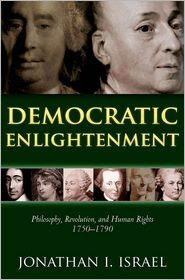New from Oxford University Press:
Democratic Enlightenment: Philosophy, Revolution, and Human Rights, 1750-1790 by
Jonathan Israel.
 About the book
About the book, from the publisher:
That the Enlightenment shaped modernity is uncontested. Yet remarkably few historians or philosophers have attempted to trace the process of ideas from the political and social turmoil of the late eighteenth century to the present day. This is precisely what Jonathan Israel now does.
In Democratic Enlightenment, Israel demonstrates that the Enlightenment was an essentially revolutionary process, driven by philosophical debate. The American Revolution and its concerns certainly acted as a major factor in the intellectual ferment that shaped the wider upheaval that followed, but the radical philosophes were no less critical than enthusiastic about the American model. From 1789, the General Revolution's impetus came from a small group of philosophe-revolutionnaires, men such as Mirabeau, Sieyes, Condorcet, Volney, Roederer, and Brissot. Not aligned to any of the social groups represented in the French National assembly, they nonetheless forged "la philosophie moderne"--in effect Radical Enlightenment ideas--into a world-transforming ideology that had a lasting impact in Latin America, Canada and eastern Europe as well as France, Italy, Germany, and the Low Countries. In addition, Israel argues that while all French revolutionary journals powerfully affirmed that la philosophie moderne was the main cause of the French Revolution, the main stream of historical thought has failed to grasp what this implies. Israel sets the record straight, demonstrating the true nature of the engine that drove the Revolution, and the intimate links between the radical wing of the Enlightenment and the anti-Robespierriste "Revolution of reason."
 About the book, from the publisher:
About the book, from the publisher:
